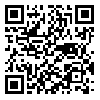Volume 19, Issue 60 (4-2025)
MLJ 2025, 19(60): 153-164 |
Back to browse issues page
Download citation:
BibTeX | RIS | EndNote | Medlars | ProCite | Reference Manager | RefWorks
Send citation to:



BibTeX | RIS | EndNote | Medlars | ProCite | Reference Manager | RefWorks
Send citation to:
Akvanian S N, SeGhafari M, Moradi A. The Right to Receive Medical Data in Traditional Communities through Health-Oriented Satellite Programs. MLJ 2025; 19 (60) :153-164
URL: http://ijmedicallaw.ir/article-1-1857-en.html
URL: http://ijmedicallaw.ir/article-1-1857-en.html
1- Department of Public Law, Semnan Branch, Islamic Azad University, Semnan, Iran.
2- Department of Public Law, Mahdishahr Branch, Islamic Azad University, Semnan, Iran
3- Department of Public Law, Semnan Branch, Islamic Azad University, Semnan, Iran.
2- Department of Public Law, Mahdishahr Branch, Islamic Azad University, Semnan, Iran
3- Department of Public Law, Semnan Branch, Islamic Azad University, Semnan, Iran.
Abstract:
Background and Aim: Traditional societies are known as societies in which citizens cannot access new information in the field of treatment and medicine due to lack of information, unrealistic customs, superstitions, etc. Meanwhile, the increase in public access to technologies such as satellite programs has caused this false information, unrealistic customs and superstitions to be exposed to verification and individuals to enjoy a higher level of health. In this regard, a right called the right to truth has emerged in human rights through which citizens can test their old customs and traditions, including in the field of medicine, through access to new satellite programs and, in case of conflict, not accept them like their predecessors.
Method: The method used in the present study is descriptive-analytical and in this regard, reliable library sources are used.
Ethical Considerations: Throughout this article, ethical considerations such as trustworthiness, scientific honesty and non-scientific bias have been observed.
Results: The use of telecommunication medical satellites is one of the least expensive ways to increase public information in the field of medical data. However, governments in traditional governments, for various reasons, including the strong influence of religious pressure groups, inefficiency, etc., generally do not want citizens to have access to health facts and try to limit access to satellite medical programs in various ways, including maintaining public order, observing good morals, etc.
Conclusion: The right to receive medical facts through health-oriented satellite programs is a matter of debate, especially in governance systems where free access to medical information can conflict with some religious and national norms. In addition, the right to free access to health information, which is recognized in Article 19 of the International Covenant on Economic, Social and Cultural Rights, has been recognized as an absolute human right and governments cannot restrict it, including by restricting the use of satellites.
Please cite this article as:
Akvanian SN, Ghafari M, Moradi A. The Right to Receive Medical Data in Traditional Communities through Health-Oriented Satellite Programs. Medical Law Journal. 2025; 19: e11.
Method: The method used in the present study is descriptive-analytical and in this regard, reliable library sources are used.
Ethical Considerations: Throughout this article, ethical considerations such as trustworthiness, scientific honesty and non-scientific bias have been observed.
Results: The use of telecommunication medical satellites is one of the least expensive ways to increase public information in the field of medical data. However, governments in traditional governments, for various reasons, including the strong influence of religious pressure groups, inefficiency, etc., generally do not want citizens to have access to health facts and try to limit access to satellite medical programs in various ways, including maintaining public order, observing good morals, etc.
Conclusion: The right to receive medical facts through health-oriented satellite programs is a matter of debate, especially in governance systems where free access to medical information can conflict with some religious and national norms. In addition, the right to free access to health information, which is recognized in Article 19 of the International Covenant on Economic, Social and Cultural Rights, has been recognized as an absolute human right and governments cannot restrict it, including by restricting the use of satellites.
Please cite this article as:
Akvanian SN, Ghafari M, Moradi A. The Right to Receive Medical Data in Traditional Communities through Health-Oriented Satellite Programs. Medical Law Journal. 2025; 19: e11.
Keywords: Right to Information, Right to Truth, Right to Free Access to Information, Public Order, Right to Health and Hygiene
Type of Study: Original Article |
Received: 2024/08/8 | Accepted: 2025/03/3
Received: 2024/08/8 | Accepted: 2025/03/3
| Rights and permissions | |
 |
This work is licensed under a Creative Commons Attribution-NonCommercial 4.0 International License. |





